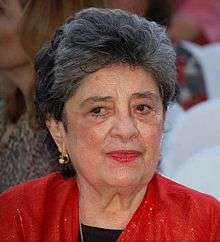Claribel Alegría
| Clara Isabel Alegría Vides | |
|---|---|
 Alegría at the 3rd annual International Poetry Festival in Granada. | |
| Born |
May 12, 1924 Estelí, Nicaragua |
| Pen name | Claribel Alegría |
| Occupation | Poet, Novelist |
| Nationality |
|
Clara Isabel Alegría Vides[1] (born May 12, 1924) is a Nicaraguan poet, essayist, novelist, and journalist who is a major voice in the literature of contemporary Central America. She writes under the pseudonym Claribel Alegría.[2] She was awarded the 2006 Neustadt International Prize for Literature.
Biography
Alegría was born in Estelí, Nicaragua and grew up in the Santa Ana area in western El Salvador. Although she was too young to read or write, she began composing poetry at the age of six and dictated them to her mother, who would write them down. Alegría consistently cites Rainer Maria Rilke's "Letters to a Young Poet" as the impetus for becoming a poet.[3] At the age of seventeen, she published her first poems in Repertorio Americano, a Central American cultural supplement. Soon after, Mexican educator José Vasconcelos arranged for Alegría to attend finishing school in Hammond, Louisiana.[4] In 1943, she moved to the United States and in 1948 received a B.A. in Philosophy and Letters from George Washington University.[5] Alegría was committed to nonviolent resistance. She had a close association with the Sandinista National Liberation Front (FSLN), which overthrew Anastasio Somoza Debayle and took control of the Nicaraguan government in 1979. Alegría returned to Nicaragua in 1985 to aid in the reconstruction of Nicaragua.[6]
Alegría now lives in Managua, Nicaragua.[5]
Career
Alegría's literary work reflects the style of the popular literary current in Central America during the 1950s and 1960s, "la generacion comprometida" (the committed generation). Like many other poets of her generation who are critical of their societies, she makes claims for rights using a language which is often counter-literary.
Alegría has published many books of poetry: Casting Off (2003), Sorrow (1999), Umbrales (1996), and La Mujer del Río (1989). She has also published novels and children's stories, as well as testimonios (often in collaboration with her husband, DJ "Bud" Flakoll), such as They Won't Take Me Alive.
Awards
- 1978 Cuban-sponsored Casa de las Américas for Sobrevivo ("I Survive"), a poetry collection. She was awarded this prize alongside Gioconda Belli.
- 2006 Neustadt International Prize for Literature.[7][8][9]
Published works
|
|
References
- ↑ "Claribel Alegría - 1924". Escritoras de Hispanoamerica. Retrieved 2007-10-24.
- ↑ "Claribel Alegría". Encyclopædia Britannica. Retrieved 2007-10-24.
- ↑ "Alegría, Claribel Joy: 1924—". www.encyclopedia.com. Retrieved 2015-10-02.
- ↑ Gale (2003). "Claribel Joy Alegría". Contemporary Hispanic Biography. Retrieved Sep 30, 2015.
- 1 2 "Claribel Alegría bio" (PDF). World Literature Today. University of Oklahoma. Retrieved 2007-10-24.
- ↑ "Claribel Alegría". Retrieved 5 October 2014.
- ↑ Bunmi Ishola (September 30, 2006). "Claribel Alegría wins Neustadt Prize". The Norman Transcript. Retrieved November 2, 2013.
- ↑ Staff writer (May 1, 2007). "Claribel Alegria: 2006 Neustadt International Prize Laureate.(special section)(Biography)". World Literature Today. Retrieved November 2, 2013.
- ↑ "Neustadt Prize". The Missouri Review. November 16, 2006. Retrieved November 2, 2013.
Further reading
- McGowan, Marcia P.; Boschetto-Sandoval, Sandra M. (1994). Claribel Alegria and Central American literature: critical essays. Athens: Ohio University Center for International Studies. ISBN 0-89680-179-9.
- McGowan, Marcia Phillips (1999). "Alegría Claribel". In Commire, Anne. Women in World History: A biographical encyclopedia. 1. Waterford, CT: Yorkin Publications, Gale Group. pp. 193–198. ISBN 0787640808.
External links
- (Spanish) Claribel Alegría gana premio internacional
- (Spanish) Encuentro-Taller con Claribel Alegría
- (Spanish) Academy of American Poets
- (Spanish) Claribel Alegria at Curbstone Press